|
|
|
Sort Order |
|
|
|
Items / Page
|
|
|
|
|
|
|
| Srl | Item |
| 1 |
ID:
080435
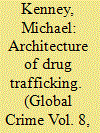

|
|
|
|
|
| Publication |
2007.
|
| Summary/Abstract |
For much of the past twenty-five years, the US-led war on drugs has been premised on a fundamental misunderstanding of Colombian drug trade. Instead of being run by a handful of massive, price-fixing 'cartels', the Colombian drug trade, then and now, was characterized by a fluid social system where flexible exchange networks expanded and retracted according to market opportunities and regulatory constraints. To support this interpretation, I draw on primary and secondary source data I collected in Colombia and the US, including interviews with several dozen hard-to-reach informants. I analyze these data to analyze the organisational form and functioning of 'Colombian' trafficking networks, focusing on how these illicit enterprises communicate, coordinate their activities, and make decisions, with an eye towards deflating some of the more persistent myths that have grown up around these transnational enterprises
|
|
|
|
|
|
|
|
|
|
|
|
|
|
|
|
| 2 |
ID:
095290
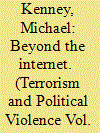

|
|
|
|
|
| Publication |
2010.
|
| Summary/Abstract |
This study challenges the conventional wisdom that the Internet is a reliable source of operational knowledge for terrorists, allowing them to train for terrorist attacks without access to real-world training camps and practical experience. The article distinguishes between abstract technical knowledge (what the Greeks called techne) and practical, experiential knowledge (mtis), investigating how each helps terrorists prepare for attacks. This distinction offers insight into how terrorists acquire the practical know-how they need to perform their activities as opposed to abstract know-what contained in bomb-making manuals. It also underscores the Internet's limitations as a source of operational knowledge for terrorists. While the Internet allows militants to share substantial techne, along with religious and ideological information, it is not particularly useful for disseminating the experiential and situational knowledge terrorists use to engage in acts of political violence. One likely reason why Al Qaeda and other Islamist terrorists have not made better use of the Internet's training potential to date is that its value as a source of operational knowledge of terrorism is limited.
|
|
|
|
|
|
|
|
|
|
|
|
|
|
|
|
| 3 |
ID:
172170
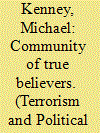

|
|
|
|
|
| Summary/Abstract |
This paper applies the concept of “communities of practice” to al-Muhajiroun (“the Emigrants”), an outlawed activist network that seeks to create an Islamic caliphate in Britain and the West through activism and proselytizing. Responding to recent studies on terrorism learning and adaptation, the author argues that focusing exclusively on the outputs of learning is unsatisfactory. Instead scholars should analyze learning as a process and unpack the causal mechanisms behind it. To support his within-case analysis, the author draws on extensive field work, including interviews and ethnographic observation. Newcomers to al-Muhajiroun learn the community’s norms and practices through repeated interactions with more experienced activists. These interactions take place in study circles and through companionship. Activists also learn by doing, preaching the Emigrants’ Salafi-Islamist ideology at da’wah stalls and protesting against the West’s “war on Islam” at demonstrations. The more they do, the better they become at performing the network’s high-risk activism, and the more deeply committed they become to its community of practice. However, far from allowing activists to adapt seamlessly to all challenges, the Emigrants’ insular and dogmatic community of practice creates its own problems, hindering its ability to innovate, expand, and thrive in an increasingly hostile environment.
|
|
|
|
|
|
|
|
|
|
|
|
|
|
|
|
| 4 |
ID:
148070
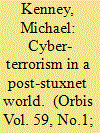

|
|
|
|
|
| Summary/Abstract |
Recent cyber-attacks such as Stuxnet and Anonymous’ increasingly aggressive digital activism have rekindled fears that cyber-terrorism is an imminent threat. However, the concept remains poorly understood. Confusion over cyber-terrorism stems, in part, from recent attempts to stretch the concept to include hacktivism and terrorists’ use of the Internet to facilitate conventional terrorism. Although the United States and other countries have experienced thousands of cyberattacks in recent years, none have risen to the level of cyber-terrorism. This article seeks to dial down the rhetoric on cyber-terrorism by explaining how it differs from cyber-attacks, cyber-warfare, hacktivism, and terrorists’ use of the Internet. The most immediate online threat from non-state terrorists lies in their ability to exploit the Internet to raise funds, research targets, and recruit supporters rather than engage in cyber-terrorism. Cyber-terrorism may well occur in the future, but for now online crime, hacktivism, and cyber-warfare are more pressing virtual dangers.
|
|
|
|
|
|
|
|
|
|
|
|
|
|
|
|
| 5 |
ID:
065553
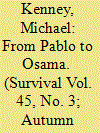

|
|
|
|
|
| Publication |
2003.
|
| Description |
p187-206
|
|
|
|
|
|
|
|
|
|
|
|
|
|
|
|
| 6 |
ID:
079294
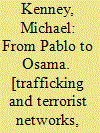

|
|
|
|
|
| Publication |
Pennsylvania, Pennsylvania state University Press, 2007.
|
| Description |
xv, 293p.
|
| Standard Number |
9780217029313
|
|
|
|
|
|
|
|
|
|
|
|
Copies: C:1/I:0,R:0,Q:0
Circulation
| Accession# | Call# | Current Location | Status | Policy | Location |
| 052699 | 363.325/KEN 052699 | Main | On Shelf | General | |
|
|
|
|
| 7 |
ID:
109784
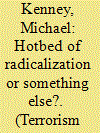

|
|
|
|
|
| Publication |
2011.
|
| Summary/Abstract |
A series of police raids in Príncipe Alfonso, a Muslim neighborhood located in the Spanish enclave of Ceuta, "confirmed" law enforcement officers' worst fears: the barrio, long considered a hotbed of Islamist radicalization, had succumbed to the influence of extremists, making Spain more vulnerable to terrorist attacks. However, the meager results of the raids, as well as delays in the ensuing criminal investigation, raised troubling questions about the alleged terrorist plot and outsiders' perceptions of the Muslim community. Seeking answers to these questions, I conducted ethnographic field work in Príncipe shortly after the raids, interviewing residents, activists, and officials and observing the community at length. The community I experienced did not match the neighborhood I had read about. This article, the first ethnographic study of Ceuta to focus on radicalization, challenges conventional understandings of Príncipe Alfonso and highlights the value of ethnographic field work in terrorism studies.
|
|
|
|
|
|
|
|
|
|
|
|
|
|
|
|
| 8 |
ID:
156540
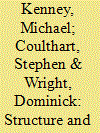

|
|
|
|
|
| Summary/Abstract |
This study combines network science and ethnography to explore how al-Muhajiroun, a banned Islamist network, continued its high-risk activism despite being targeted for disruption by British authorities. We analyze news reports, interviews, and field notes using social network analysis and qualitative content analysis to test hypotheses pertaining to network structure and performance. Our analysis suggests that the activist network’s structural properties had important implications for its performance during three separate time periods. What began as a centralized, scale-free-like, small-world network centered on a charismatic leader evolved into a more decentralized “small-world-like” network featuring clusters of local activists connected through multiple bridges. This structure allowed the activist network to engage in contentious politics even as its environment became increasingly hostile. We conclude by discussing the implications of al-Muhajiroun’s small-world solution for scholars and policy makers.
|
|
|
|
|
|
|
|
|
|
|
|
|
|
|
|
|
|
|
|
|